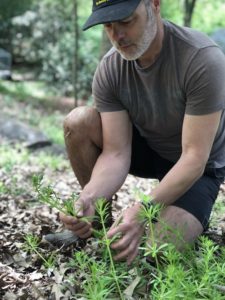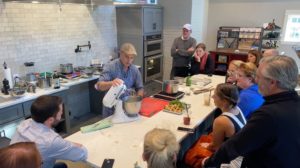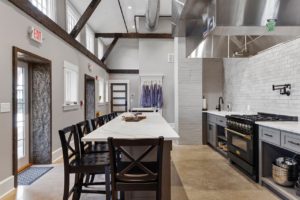
Jeff Ross will never go hungry. A celebrated gardener and artisan chef, he believes no one should go hungry because we are surrounded by a multitude of plants we can forage.
Ross will be teaching the basics of foraging – where to find and recognize edible wild plant – during a bundled cooking school weekend, June 17 and 18 at the International Choux Co. the cooking school at The Inns of St. Albans. It will be the first offering of a series of guest chef classes slated at the ICC CookINN School, housed in a recently renovated historic building at the Inns of St. Albans.

“It’s going to be fun. St. Albans sits on really nice property along the river that has some great plants. And the St. Albans learning kitchen is a beautiful place,” Ross said, as he explained some of the elements of the classes. “We’ll explore and hike around the property and look for plants and shagbark hickory. The region has a lot of shagbark hickory, which we’ll use to make syrup out of the bark.”
Ross emphasized that the recipes he presents will spotlight foraged plants, along with recommendations on how to augment those recipes, when needed. As he explained, “If you can’t find chickweed or nettles, you can substitute things from your own garden or garden market that’s in the same family.”
Ross has always had an intense interest in natural plants and their uses for both culinary and medical purposes. Through the years he honed his garnering, horticulture and forging skills, especially while he managed the organic gardens of Blackberry Farm in the mountains of Tennessee – a five-acre garden that sat on about 5,000 acres, where everywhere he looked, he saw something to eat.
“We’re lucky to live in southern Appalachia where there are 5,000 species of plants, of which 1,000 are edible,” Ross said. “We all have edible plants around us. We just don’t know it. As an example, I joke with my classes that the way to eat healthy at a fast-food restaurant – where day lilies are almost always planted – is to drive up to the drive through, roll down the window and grab a handful of day lilies. Then drive off and add them to a salad.”
When asked what tips he could recommend to novices just learning the basics of foraging, Ross said, “Look around the margins of the woods. That’s where you’ll see wildlife foraging, and it’s where you’ll find the food, too. Look for greens, barks and berries and things of that nature, which is the crux of a foraged meal. And if you find mushrooms, you’ve hit the lottery.”
Ross is quick to caution anyone who forages for mushrooms to get them identified correctly to ensure they are safe. The Missouri Conservation Department has information to share on mushrooms, as well as other wild Missouri edibles.
“You don’t have to hike five miles into the woods to find food,” Ross said. “Look around your own property, your backyard lawn or a vacant lot. There are plenty of things to eat that you pass by every day.”

Ross’s classes at The Inns at St. Albans International Choux Co. school are broken into segments over two days. June 17 will feature demonstration classes, a Lunch and Learn class and an evening Happy Hour and Appetizer class. On June 18, Ross will lead a morning foraging hike, an afternoon demonstration class and an al fresco evening dinner. A total of five events are planned over the two-day program.
Ross has generously shared his recipe for Hickory Infused Maple Syrup made with forged bark from the shagbark hickory tree.
HICKORY-INFUSED MAPLE SYRUP
Yield: 2 cups
1 6-inch piece of shagbark hickory (Carya ovata) bark, broken in half
1 1/2 cup real maple syrup
1/2 cup fresh squeezed orange juice
2 tablespoons butter, chilled
Preheat oven to 400 F. Place bark on cookie sheet and roast in oven for 15 minutes, until very fragrant. In saucepan, combine maple syrup and roasted bark. Turn heat to low and allow to simmer 10-12 minutes. Add orange juice and heat for 1 minute. Remove bark and whisk in butter. Use to pour over fruit (oranges or pineapple), over crepes, or in cocktails. Store in refrigerator for up to two weeks.





